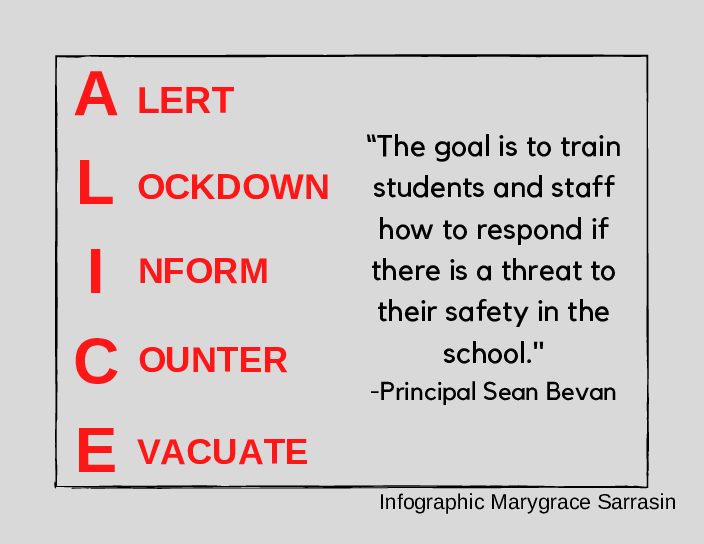ALICE at Algonquin
Students, faculty participate in school-wide drill to review ALICE protocol
Algonquin had its first ALICE lockdown drill on Sept. 9 for students to practice and discuss their response to a potential danger in the building.
September 21, 2021
School administrators initiated the first ALICE drill of the year on Sept. 9 to allow students and faculty to practice the safety protocol that has been ingrained in the minds of students since elementary school.
As Principal Sean Bevan described a fake lockdown scenario over the loudspeaker during Period 3, students and teachers were tasked with deciding how they would respond to the situation. This tabletop discussion-based ALICE drill forced students and teachers to use the procedure (an acronym which stands for alert, lockdown, inform, counter and evacuate) to consider all possible options and make the choice of how they would react in the scenario provided.
As this event was the first ALICE drill at Algonquin for both freshmen and sophomores due to the impact COVID-19 had on the 2020-2021 school year, Principal Sean Bevan recognizes the importance of these practices.
“[COVID-19] made [ALICE] a higher priority to talk about in the opening days of school,” Bevan said. “Recognizing that our freshmen were new to the building and have not been trained on ALICE in our building, that is every year. But when you also consider that our current sophomores had a whole year of COVID-19-related schooling, and we did not do any ALICE drills because we could not, half our building of students were not trained properly, and we wanted to make sure that training happened in our first days of school.”
Although this recent drill held extra importance, Assistant Principal Tim McDonald believes ALICE drills are vital for all school community members.
“We tell everybody in the school to discuss it,” McDonald said. “Every different office, the office staff, the cafeteria, the facilities, the custodians; we all need to be prepared for such an event. We were all listening to that prompt and that scenario so we can be thinking about how well prepared we can be to make that decision and steer clear of danger.”
Although Algonquin’s administration team carefully organizes each fake ALICE scenario, teachers and students are required to act as though it is a real emergency. Chemistry teacher Lorraine Zanini has worked at Algonquin for 34 years and believes it’s important to teach and practice ALICE.
“I think when it is a drill it is good to practice,” Zanini said. “In any situation where it is not a drill, many kids and adults panic, so it is nice to have that opportunity to go through it in a non-threatening way just to review. Also, [ALICE] is something that is so new for kids and teachers, that I think you need to practice it to get better at it. We have never given kids that opportunity to make the decisions themselves, usually it is teachers telling them what they are going to do. With ALICE, we are empowering the kids to make those decisions of what is best for our class.”
ALICE strives to provide students with enough options and knowledge for them to confidently make decisions regarding their safety. Sophomore Molly Giguere discussed this with her chemistry class on Thursday, Sept. 9.
“I think I would do what I am supposed to do, but I would be freaked out and nervous,” Giguere said.
Overall, Bevan and McDonald were satisfied with how the recent drill ran.
“I really appreciate the participation that we got in the exercise we did recently,” McDonald said. “The continued participation and taking it seriously is really important. Not only the faculty and the staff, the first responders want to know that we are taking it seriously, so we know we have the best chance of responding to a real threat.”
Bevan has confirmed that there will be two more ALICE drills this school year.










